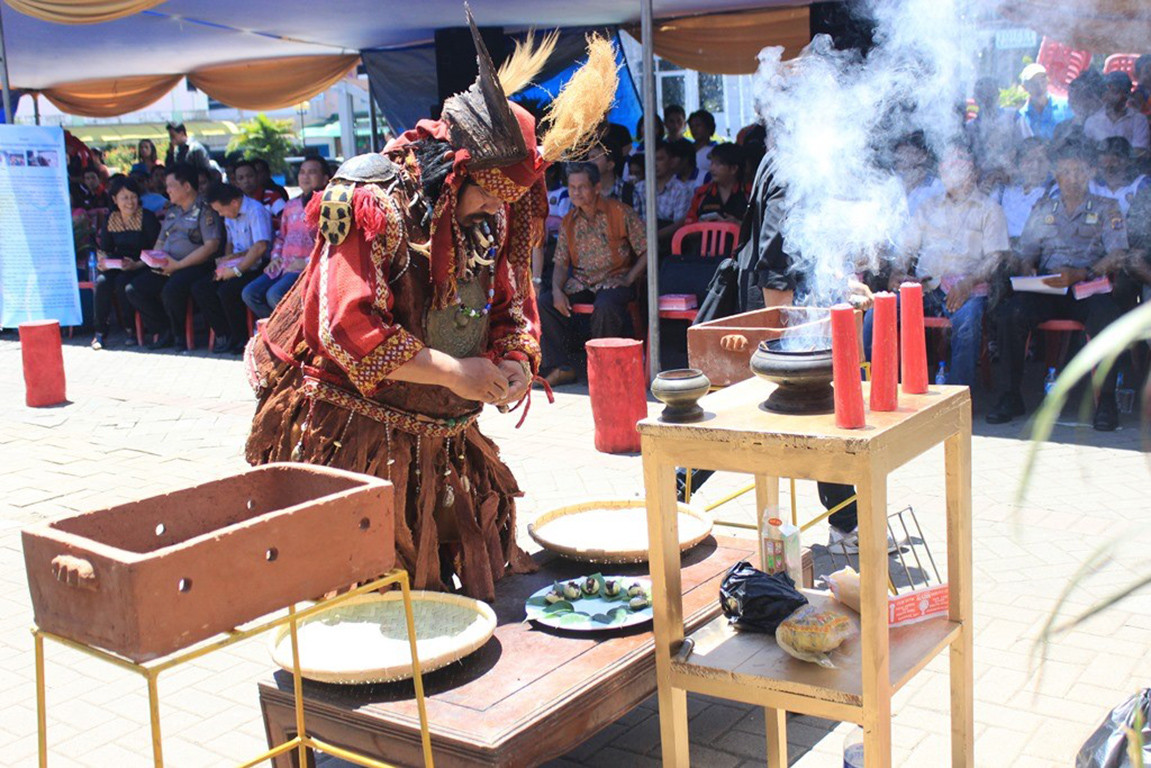Popular Reads
Top Results
Can't find what you're looking for?
View all search resultsPopular Reads
Top Results
Can't find what you're looking for?
View all search resultsNative faith believers in North Sulawesi celebrate freedom of religion
Thousands of believers of the native Malesung faith in Monahasa, North Sulawesi, cherish that the government is now officially recognizing their traditional religion, thanks to a judicial review by the Constitutional Court in 2017 that ruled for a lawsuit challenging the 2003 Civil Administration Law.
Change text size
Gift Premium Articles
to Anyone
A
Constitutional Court ruling in 2017 ordering the government to recognize indigenous native faiths and put them in the religious column on identity cards has been celebrated by many traditional religion believers, including those of the Malesung faith of North Sulawesi.
Malesung is an old native faith from the land of Minahasa in the province. It is estimated it still has thousands of believers who practice its rituals and prayers.
Sual, a Malesung believer who did not wish to reveal his first name, said his native faith had been recognized by the government as its name had been listed on his family card. Soon, the religion column in his identity card would be filled with the words: “Faith in the Almighty God.”
"I feel that it is getting easier for us to work on administrative arrangements, specifically regarding the inclusion of local faiths on our identity cards, after the Constitutional Court’s ruling,” he told The Jakarta Post on Tuesday.
The Constitutional Court ruled three years ago in favor of native-faith followers in a judicial review of the 2013 Civil Administration Law. The court said articles in the law requiring adherents of indigenous faiths to leave the religion columns of in their ID cards blank were discriminatory.
For Sual, the freedom to show his identity in the civil registry is pivotal. He was the first one among the Malesung believers to make the arrangement with the civil registry authorities regarding his faith.
“Another eight people have gotten their [updated] family cards. They are now in the process of revising their ID cards,” he said.
Sual said everyone practicing traditional Minahasa rituals could be seen as Malesung faith followers. Some had openly acknowledged their beliefs, while others chose to keep stating their religion as it was previously regulated by the government on their ID cards.
Malesung rituals symbolize a way to establish a relationship with the Creator, who is known by several names, such as Empung Wailan Wangko, Empung Kasuruan Wangko and Opo Wana Natas.
The rituals are often done in open spaces. “This way, we can hear the signs of nature more clearly. They can’t be done in buildings as we grew out of an agricultural culture,” Sual said.
The Creator figure in Malesung belief is represented by Muku’, who are messengers sent to interact with believers. Sual explained that some Muku’ are ancestors who are le’os (good), while others are lewo’ (bad).
They serve as intermediaries to give direction and advice to Malesung believers.
Sual further explained the concept of God in the Malesung religion consisted of three parts: Manalinga (the one who hears), Manembo (the one who sees) and Renga-Renga’an (the one who loves and punishes).
Malesung believers, he said, often experienced rejection, especially by followers of other religions. However, Sual said Malesung believers responded by only focusing on conveying their love to the Creator.
Denny Pinontoan, a theology professor at the Tomohon Indonesia Christian University in North Sulawesi, said the inclusion of native faiths in civil registry documents such as family and ID cards was in line with the Constitution, as it was parallel with the principle of religious freedom.
He said he appreciated the Minahasa people who wanted to revive the Malesung faith or pass it down to the younger generations.
“This ancestral belief existed long before the government established the six officials religions; therefore, [Malesung] is not a new religion,” Denny said.
The professor, who once wrote a dissertation on the traditional multicultural Minahasa society, said the government's recognition of ancient beliefs had shown the diversity in Minahasa and more generally in North Sulawesi.
“There’s a belief in Sangihe called Masade or Old Islam. There is also the Musi native belief in Talaud.”
These might surprise many people as the general public often think that Christianity had been practiced in Minahasa for a long time, Denny said.
“Christianity had been embraced since the late 19th century when it was brought by European missionaries. However, it did not completely replace native beliefs such as Malesung, as people still practice its rituals and important elements until now,” said Denny. (aly)










